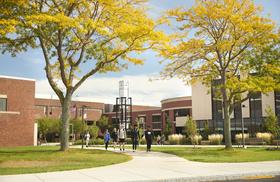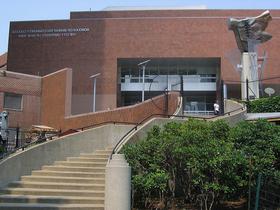The American Recovery and Reinvestment Act 2009 was designed to create jobs and promote economic recovery after the recession. Many community colleges are cashing in on stimulus funding that allows them to increase their student loads and improve training that will help students find lucrative careers after graduation. Learn how these community colleges use stimulus monies to their fullest advantage.
Medical Technology
Cuyahoga Community College in Cleveland, Ohio, and Los Rios Community College District in Sacramento, California, have received money to participate in a U.S. Department of Health and Human Services program. This program is designed to train students on how to convert current medical records to a computerized, paperless system. This program will be a part of the national effort to meet requirements that every U.S. citizen will have an electronic medical record by the year 2014, according to TMCnet.com.
Cuyahoga Community College and 17 other community colleges in the area are slated to receive about $7 million the first year, with a subsequent $7 million the following year. The Los Rios District, along with 14 colleges in California, Nevada, Arizona, and Hawaii, will share $5.4 million in federal funding for the first year and another $5.3 million for the second, according to a report in the Sacramento Bee.
The program will involve cross-training students in the medical and information technology fields. Students will be able to complete their training in six months or less in some locations, getting them out of the classroom and into related jobs as quickly as possible. This is accomplished through a system where students can easily identify gaps in their education and only take the classes they need to complete their training. Students save money, as well as time, by customizing the program to their unique needs.
This video explains medical technology and what's involved.
Smart Grid Programs
Smart grid technology is another area targeted by stimulus funding, but this time through the U.S. Department of Energy. According to the St. Louis Business Journal, St. Louis Community College will receive more than $80,000 in funding to train students in installing, maintaining, and supporting "smart" devices and software.
This program is specifically designed to prepare students for careers in the utility and electrical manufacturing industries. Through a network of community colleges like St. Louis Community College, the federal government hopes to train more than 30,000 Americans to modernize the nation's electrical grid through smart grid technologies.
Sustainable Energy Technician Programs
Many experts believe that our country faces a rocky future without sustainable energy. The federal government is now behind energy efforts to provide funding to community colleges that can facilitate training for sustainable energy technicians. The University of Missouri has received a grant from the Department of Labor, which they will use to collaborate with neighboring community colleges like St. Louis Community College, Linn State Technical College, and Crowder College to train workers for employment in the energy sector, according to a report in the MU campus newspaper, Maneater.
In addition to training displaced workers, the schools will offer two-year programs for teaching students. The project's programs will also be available to other schools to use as a model as they implement their programs. In addition to its collaboration with a number of community colleges, MU is working closely with the Missouri Division of Workforce Development and the Missouri Energy Workforce Consortium.
This video explains what a sustainable energy technician does.
Healthcare Training
It is no secret that our healthcare sector is lacking personnel to adequately care for patients today. To alleviate the shortage of nurses and other health care professionals, the Department of Labor has issued a grant through the ARRA to the Community College of Baltimore County for this explicit purpose. The school received nearly $5 million in funding to strengthen its healthcare studies programs, opening the door to many more students interested in medical careers.
According to a report in the Catonsville Times, the college plans to use the money to support its Certified Nursing Assistant, Nurse Support Technician, Licensed Practical Nurse, Associate Degree Nurse, and Respiratory Therapist programs. The funding will offer sufficient support to train more than 2,000 students over a period of three years. Baltimore County Executive Jim Smith told the Times that the new programs would be an integral part of the implementation of the recently signed healthcare bill because it would train more professionals to care for the newly insured.
Americans may not see all the positive effects of the stimulus package right away, but community colleges are currently putting the money to good use as they train a new generation of American workers to handle the needs of our country.
Questions? Contact us on Facebook. @communitycollegereview















